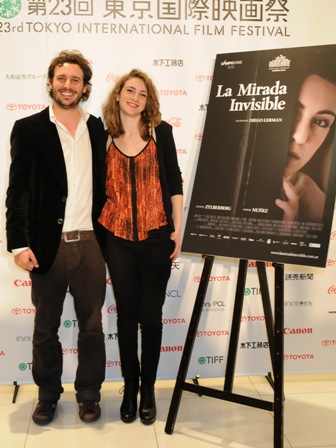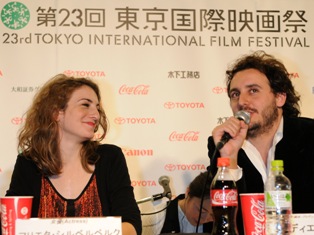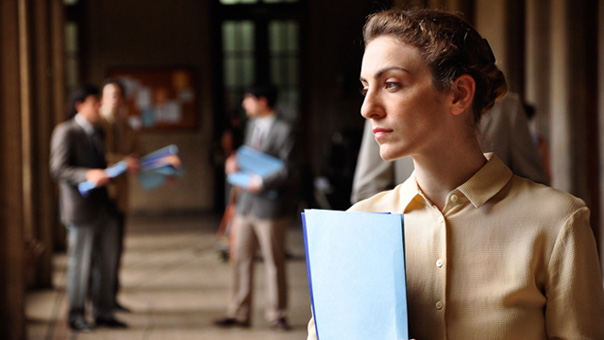2010.10.29
[Event Reports]
10/29 (Fri) Competition Section "The Invisible Eye" Press Conference and Q&A: Notes & Quotes

Press Conference: October 29th (Friday), from 16:15 @TIFF Movie Café
Q&A Session: October 30th (Saturday) from 18:35 @TOHO Cinemas Roppongi Hills Screen 6
Appearance: Diego Lerman (director/screenplay/producer), Julieta Zylberberg (actress)

©2010 TIFF
Here are some notes and quotes:
Julieta Zylberberg (JZ): It's our first time to come to the Tokyo International Film Festival. We're having a great time.
Diego Lerman(DL): I'm very happy to be here screening our movie. I'm also honored to be here representing our film.
Q: This film is based on a novel written by Martin Kohan. When did you read this book and decide to adapt it into a film?
DL: I read it on February 22, 2008 at 3 o'clock in the afternoon... OK, that's a joke! But yes, I did read it in 2008 and I immediately wanted to adapt the story into a film. I met Martin Kohan right away and we started shooting in December 2009 until February 2010, the summer season in South America. The reason why we shot it during the summer was because schools were on vacation.

©2010 TIFF
Q: This film is very different from your last film, Tan De Repente. The boy who Mar├Ła Teresa falls for is not very handsome according to Japanese standards. Why was she attracted to him?
DL: To tell the truth, we didn't want the boy to be a typical handsome boy with blond hair and blue eyes. I chose that boy because he had very deep and pensive eyes, almost like an angel and I found them very attractive.
Q: How did you meet Julieta?
DL: When I decided to make an adaptation of the novel, I thought that Julieta would be perfect for that role. I've seen her in some other films and I was sure that she was a great actress and I am very happy with what she did.
Q: Julieta, how did you feel when you were offered the role? Had you already read the book at that point?
JZ: Diego contacted me when he finished the first rough script and I was very attracted to the story and the character. As for the book, I read it while going through the script with the other actors.
Q: Diego, you were born in 1976 during the times of military dictatorship. How were you influenced by this?
DL: I was born on March 24, 1976, the very day the coup'd'état took place in Buenos Aires. The military dictatorship in Argentina was during my childhood so I don't remember much of it. However, my parents were involved in anti-government activities so we would live in hiding, moving from one place to another. But these are all vague and abstract memories. I remember feeling fear, seeing adults engaged in serious discussions, and people disappearing all of a sudden. I have relatives who have fled to Ecuador and others who are, what we call 'missing'ŌĆökilled by the government army.
Q: The visuals of this movie are very beautiful. What were the aesthetics you were conscious of during filming?
DL: I didn't want to express my aesthetics rigidly. That is because the story and ambience of the film is already quite rigid. I also wanted to use Mar├Ła Teresa's subjective perspectives and sensations. In order to express this, I was conscious of moving the camera at all the times but at the same time, I wanted to capture what the camera was not shooting. So my starting point was to show the world through Mar├Ła Teresa's eyes.
I've had several favorite film directors over the times. I like directors who make films that touch my heart. That feeling is like magic, inexplicable beyond words. If I had to name one director, it would probably be Luis Bu├▒uel.
At the Q&A Session this evening, Zylberberg on commented Mar├Ła Teresa's character.
JZ: She is a very strict person but at the same time, she feels desire toward her student. I wanted to express her rigidness and desire as well as the tension created by both qualities. I worked very closely with the director and the cast many months prior to shooting. Mar├Ła Teresa's character evolves as the story progresses. In the beginning, she is attracted to Biasutto but soon loses interest in him. She also becomes obsessed with catching students smoking. This has to do with how she came in touch with her own feelings and of all the past sexuality she had that had been reprimanded, which made her a more humanly person.
DL: One of the issues we had was to decide on how Mar├Ła Teresa would walk. I asked Julieta to try different ways of walking until we found the one that matched Mar├Ła Teresa's image. We also talked a lot about her rigid personality and that from within that rigidness came a lot of shades of color. She is always mentally active. This is what I wanted to convey to Julieta and she did a wonderful job expressing this.
The Invisible Eye
 Film Information
Film Information



